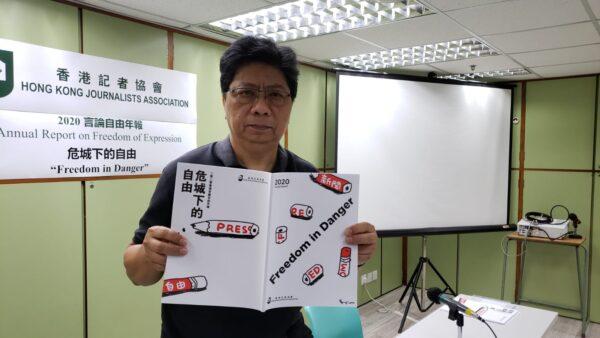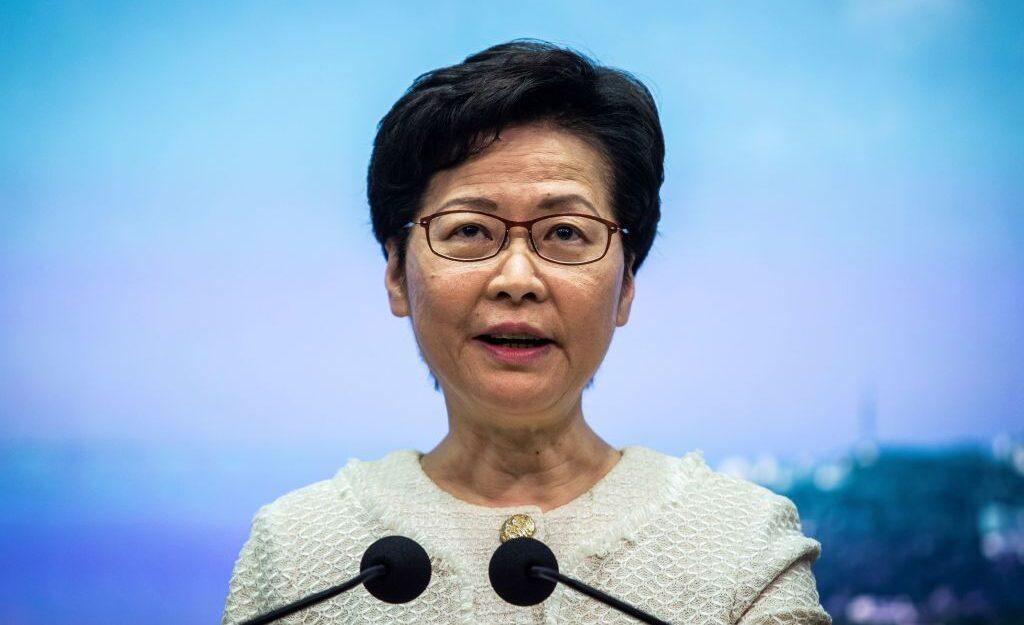Hong Kong leader Carrie Lam unashamedly defended Beijing’s newly-implemented national security law on July 7, but failed to address specific concerns such as the impact of the new law on press freedom in the city.
Speaking at her weekly press conference on Tuesday, the pro-Beijing chief executive of the former British colony branded the mass demonstrations that have gripped Hong Kong since June last year as an “escalating national security risk” for Beijing, which she explained was the reason behind the central Chinese government’s push for the law.
Millions of Hongkongers have taken to the streets in the past year to push back against Beijing’s encroachment in their daily affairs, while calling for greater democracy in the city’s political system, such as universal suffrage. The Hong Kong leader, also known as the chief executive, is elected by a 1,200-member election committee—a mostly pro-Beijing body chosen by a small group of eligible voters. There are roughly seven million Hong Kong residents.
Lam claimed that the national security law “respects and protects human rights,” and that the law was “relatively mild” compared to national security laws in other countries. She also claimed that the law’s offenses “are clearly defined”—a position only echoed by the central government in Beijing.
Lam attempted to ease concerns about the law. She said her government was doing more to “protect human rights” by deciding to announce details about Article 43. Taking a page from the playbook of China’s state-run media, Lam said the law “targets only a small group of people” in Hong Kong. She stated that her government will “vigorously implement” the law.
She again called some Hong Kong protesters “radicals” and warned them “not to violate this law or crossing the red line because the sequence is serious.”
Lam slammed all criticisms about how the law signified the death of the “one country, two systems” agreement, labeling it an “unfounded allegation.”
“One country, two systems” is a framework by which Beijing promised to preserve Hong Kong’s autonomy upon the city’s transfer of sovereignty from Britain to China in 1997, in accordance with the 1984-signed handover agreement, the Sino-British Joint Declaration.
“The United States condemns Beijing’s repeated failure to live up to its obligations under the Sino-British Joint Declaration, and these latest assaults on the rights and freedoms of the people of Hong Kong,” Pompeo stated.
When asked by a reporter whether she could 100 percent guarantee press freedom under the law, Lam avoided directly addressing the question.
“If the Foreign Correspondents Club or all reporters in Hong Kong can give me a 100 percent guarantee, that they will not commit any offenses under this piece of national legislation, then I can do the same,” Lam said.
“It’s not a question of me standing here to give you a guarantee of what you may or may not do in the days and weeks and years ahead,” she added.
Lam did not respond when asked if she was going to make the unofficial anthem of the mass protest movement “Glory to Hong Kong” illegal since it contains the banned protest slogan “revolution of our times.”

“The ‘chilling effect’ was observed soon after the law was implemented. Various shops and restaurants had their protest slogans or signs removed. The press always bears the brunt. It is expected that self-censorship will be more serious than ever,” HKJA stated.





